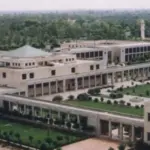ISLAMABAD, Apr 7 (APP): Minister of State for Law and Justice Shahadat Awan has proposed the formation of separate courts in the country – a constitutional superior court and a federal supreme court, with the aim to efficiently resolve both constitutional and normal cases.
The issue of pending cases in the Supreme Court and Higher Courts was brought to the attention of the Upper House by Senator Rukhsana Zubairi in a recent Calling Attention Notice, presented in Senate.
Responding to the Notice, Minister of State for Law and Justice Shahadat Awan listed several reasons for the backlog, including unnecessary litigation, an increasing trend of people filing cases, and unnecessary adjournments. He also highlighted the failure to decide cases within the prescribed time frame as a major contributing factor to the issue.
The Minister acknowledged that the shortage of judges has been a significant issue for the judiciary, with the lack of judicial appointments resulting in delays and a growing backlog of cases. He emphasized the need for the appointment of more judges to address the issue.
The backlog of cases is a persistent problem in the country’s legal system, with thousands of cases pending in various courts. The delay in resolving these cases not only causes frustration and inconvenience for litigants but also undermines the public confidence in the judicial system.
Expressing concern over the large number of pending cases in the superior judiciary, the Minister revealed that currently, there were more than 380,436 cases pending in higher courts as of December 31, 2022.
He acknowledged that the superior judiciary was independent and that the government could not interfere in its workings. However, he emphasized the need for timely resolution of cases and called for measures to address the backlog of cases.
The shortage of judges has been identified as a significant factor contributing to the backlog of cases in superior judiciary. According to Minister of State for Law and Justice Shahadat Awan, there are currently a total of 17 judges in the Supreme Court, with 14 judges serving.
In addition, the Lahore High Court has 19 vacant judge posts, while the Sindh High Court has 11 vacant posts. The Peshawar High Court has one vacant judge post and the Islamabad High Court has two vacant judge posts.
According to the Minister’s statement, the Supreme Court had 51,744 pending cases, while the Lahore High Court had 179,425, the Sindh High Court had 85,779 pending cases, the Peshawar High Court had 41,911 pending cases, the Balochistan High Court had 4,471 pending cases and the Islamabad High Court had 17,104 cases pending. Additionally, the Federal Shariat Court had 103 pending cases.
Earlier, Senator Rukhsana Zubairi raised concerns about the pendency of cases in the superior judiciary and called for reforms to improve the efficiency of the judiciary and ensure timely resolution of cases.





